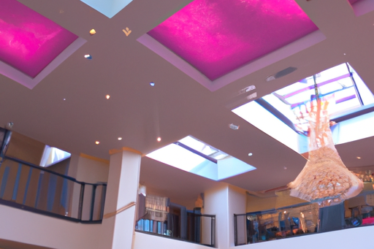
The Impact of Revenue Management on Hotel Operations
The success of a hotel relies heavily on its ability to effectively manage its revenue. Revenue management is a crucial aspect of hotel operations, as it directly impacts the overall profitability and success of the establishment. In this article, we will explore the undeniable connection between revenue management and hotel operations, and how revenue management strategies can significantly impact various aspects of a hotel’s operations.
One of the primary ways in which revenue management impacts hotel operations is through pricing and inventory management. Revenue managers are responsible for setting the right prices for hotel rooms and managing the availability of inventory. By analyzing market demand, competitor pricing, and historical data, revenue managers can determine the optimal pricing strategy for maximizing revenue. This not only ensures that rooms are priced competitively but also helps in avoiding overbooking or underpricing, which can lead to lost revenue opportunities.
Furthermore, revenue management plays a crucial role in forecasting and demand management. By analyzing historical data and market trends, revenue managers can accurately predict demand patterns and adjust pricing and inventory accordingly. This allows hotels to optimize their operations by staffing appropriately, ensuring sufficient supplies, and providing the best possible guest experience. By aligning supply with demand, hotels can avoid overstaffing during low-demand periods and understaffing during peak seasons, thus optimizing operational efficiency.
Another significant impact of revenue management on hotel operations is in the area of marketing and distribution. Revenue managers work closely with marketing teams to develop effective pricing and promotional strategies. By understanding market segments and customer preferences, revenue managers can identify opportunities for targeted marketing campaigns and promotions. This not only helps in attracting the right customers but also ensures that the hotel is effectively utilizing its distribution channels to reach its target audience.
Moreover, revenue management also influences the decision-making process for capital investments and renovations. By analyzing revenue and profitability data, revenue managers can identify areas of improvement and make informed decisions regarding capital investments. For example, if a particular room category consistently generates higher revenue, the hotel may choose to invest in upgrading those rooms to further enhance their revenue potential. Similarly, revenue management insights can help in identifying areas where renovations or upgrades are needed to improve guest satisfaction and increase revenue.
In conclusion, revenue management and hotel operations are undeniably interconnected. Revenue management strategies have a significant impact on various aspects of hotel operations, including pricing and inventory management, forecasting and demand management, marketing and distribution, and capital investments. By effectively managing revenue, hotels can optimize their operations, maximize profitability, and provide an exceptional guest experience. Therefore, it is crucial for hotels to prioritize revenue management as an integral part of their overall operations strategy.
Strategies for Integrating Revenue Management and Hotel Operations

The success of a hotel depends on many factors, but two key areas that play a crucial role are revenue management and hotel operations. These two aspects are often seen as separate entities, but in reality, they are deeply interconnected. Integrating revenue management strategies with hotel operations can lead to increased profitability and improved guest satisfaction.
One strategy for integrating revenue management and hotel operations is to establish clear communication channels between the revenue management team and the various departments within the hotel. This ensures that everyone is on the same page and working towards the same goals. For example, the revenue management team can provide the front desk staff with information about upcoming high-demand periods, allowing them to adjust rates accordingly and maximize revenue. Similarly, the housekeeping department can inform the revenue management team about the availability of rooms for potential upselling opportunities.
Another strategy is to implement a revenue management system that is integrated with the hotel’s property management system (PMS). This allows for real-time data sharing and analysis, enabling the revenue management team to make informed decisions based on up-to-date information. For example, if the PMS shows that a certain room type is consistently in high demand, the revenue management team can adjust rates accordingly to maximize revenue. Additionally, the integration of the PMS with the revenue management system allows for seamless inventory management, ensuring that rooms are accurately allocated and available for sale.
Furthermore, training and education play a crucial role in integrating revenue management and hotel operations. It is important for all staff members to have a basic understanding of revenue management principles and how their roles contribute to the overall revenue generation of the hotel. This can be achieved through regular training sessions and workshops. For example, the revenue management team can conduct training sessions for the front desk staff on how to effectively upsell rooms or packages to guests. Similarly, the housekeeping department can be trained on the importance of maintaining room availability and cleanliness to maximize revenue potential.
In addition to training, it is essential to establish key performance indicators (KPIs) that align revenue management and hotel operations. These KPIs can be used to measure the success of integration efforts and identify areas for improvement. For example, a KPI could be the average daily rate (ADR) achieved during high-demand periods. By tracking this metric, the revenue management team can assess the effectiveness of their pricing strategies, while the hotel operations team can evaluate their ability to meet guest expectations during busy times.
Lastly, regular collaboration and feedback between the revenue management team and hotel operations are vital for successful integration. This can be achieved through regular meetings and open lines of communication. For example, the revenue management team can provide feedback to the housekeeping department on the impact of room availability on revenue generation. Similarly, the hotel operations team can provide feedback to the revenue management team on guest satisfaction levels during high-demand periods. This collaboration allows for continuous improvement and ensures that both revenue management and hotel operations are working towards the common goal of maximizing profitability and guest satisfaction.
In conclusion, integrating revenue management and hotel operations is essential for the success of a hotel. By establishing clear communication channels, implementing integrated systems, providing training and education, setting KPIs, and fostering collaboration, hotels can achieve increased profitability and improved guest satisfaction. The undeniable connection between revenue management and hotel operations should not be overlooked, as it has the potential to transform a hotel’s performance and reputation in the industry.
Maximizing Profitability through Effective Revenue Management and Hotel Operations
The success of a hotel depends on many factors, but two key components that play a crucial role in maximizing profitability are effective revenue management and efficient hotel operations. These two aspects are undeniably connected and work hand in hand to ensure the financial success of a hotel.
Revenue management is the practice of strategically managing room rates and inventory to maximize revenue. It involves analyzing market demand, setting prices accordingly, and implementing strategies to optimize occupancy and revenue. On the other hand, hotel operations encompass all the activities and processes involved in running a hotel smoothly, including front desk operations, housekeeping, food and beverage services, and maintenance.
The connection between revenue management and hotel operations is evident from the moment a guest checks in. A well-managed front desk operation ensures a smooth and efficient check-in process, which sets the tone for the guest’s stay. This positive experience can lead to repeat business and positive word-of-mouth recommendations, ultimately driving revenue. Additionally, an efficient front desk operation can help identify opportunities for upselling and cross-selling, further increasing revenue.
Housekeeping is another crucial aspect of hotel operations that directly impacts revenue management. A clean and well-maintained room not only enhances the guest experience but also allows the hotel to charge higher rates. Guests are willing to pay more for a comfortable and clean room, and this directly translates into increased revenue. Effective communication between revenue management and housekeeping is essential to ensure that rooms are available for sale at the right time and at the right price.
Food and beverage services also play a significant role in revenue management and hotel operations. A well-managed restaurant or bar can generate substantial revenue for a hotel. Revenue management strategies can be applied to optimize pricing and availability of tables, ensuring maximum profitability. Efficient kitchen operations and well-trained staff are essential to deliver high-quality food and beverage services, which in turn contribute to positive guest experiences and increased revenue.
Maintenance is often an overlooked aspect of hotel operations, but it is crucial for revenue management. A well-maintained property not only enhances the guest experience but also reduces operational costs. Regular maintenance and preventive measures can help avoid costly repairs and replacements, ultimately saving the hotel money. Additionally, a well-maintained property attracts more guests and allows the hotel to charge higher rates, further increasing revenue.
Effective communication and collaboration between revenue management and hotel operations are essential for maximizing profitability. Revenue management relies on accurate and up-to-date information from hotel operations to make informed decisions. Similarly, hotel operations need guidance from revenue management to understand market demand and adjust their operations accordingly. Regular meetings and open lines of communication between these two departments are crucial for success.
In conclusion, revenue management and hotel operations are undeniably connected and work together to maximize profitability. From the moment a guest checks in to the time they check out, effective revenue management and efficient hotel operations play a crucial role in delivering a positive guest experience and driving revenue. By understanding and leveraging this connection, hotels can achieve financial success and stay ahead in a competitive industry.


